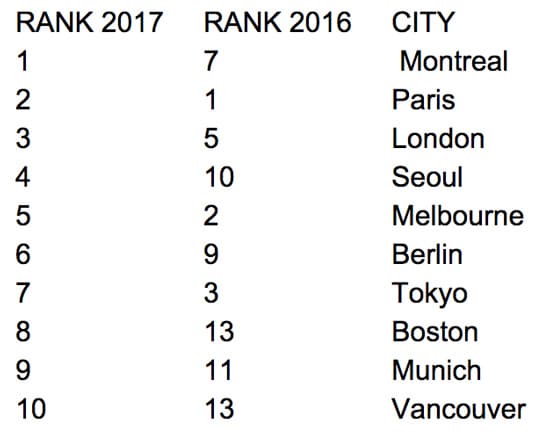Montreal tops global list of student cities
The latest ranking of study destinations scores 125 cities around the world according to the ranking of their higher education institutions, attractiveness to international students, affordability, and employer recruiting.
The QS Best Student Cities 2017 showcases some significant gains and drops across the ranking table, which in turn point to underlying demand factors such as affordability and shifting currency values.
Montreal tops the ranking this year, moving up six spots from 2016, and taking over from Paris, which was the top-ranked city destination for the last four years. Remarking on Montreal’s spot at the top of the ranking table, Concordia University President Alan Shepard said, "Canada’s education lure is no mystery. Our universities do well in international rankings. We have the lowest cost of living and highest quality of life among G7 countries."
Indeed, that combination of affordability, quality of education, and student experience seem to have been the driving factors behind Canada’s strong performance in the 2017 ranking: four of the five Canadian cities included in the table moved up this year, and Ottawa took the top spot worldwide in the new "Student View" category. Student View is a new student survey factor in the QS ranking that measures students’ ratings of their city in eight categories: tolerance and inclusion, diversity, friendliness, ease of getting around, affordability, nightlife, employment opportunities, and arts and culture.
Paris moves down to the second position this year, and is followed by London which moves up two places for 2017. Overall, six of the eight UK cities in the table rose in the rankings this year.

- University Rankings: Reflects the performance of a city’s universities based on their placement in the QS World University Rankings.
- Student Mix: Indicates the size and composition of the student body in each city.
- Desirability: A more complex factor that weighs a city’s scores across a number of liveability indices, and also incorporates student input regarding the relative attractiveness of city destinations.
- Employer Activity: Reflects the priority that employers place on a city and its institutions in terms of employee recruiting.
- Affordability: Reflects both tuition and living costs.
- Student View: An online survey of 18,000 students in which respondents were asked to rate their city across several lifestyle and student experience factors.
For more on destination attractiveness and affordability, please see:
- "Affordability a key factor for US-bound international students"
- "2016 Agent Barometer survey reveals important shifts in destination appeal and student perceptions"
- "Comparing the costs of study for leading city destinations"
- "Shifting currencies expected to drive growth for more affordable destinations"
















